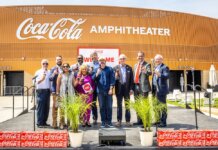 St. Paul United Methodist Church of Birmingham will receive $500,000 from the National Park Service to preserve and highlight its unique contributions to the Civil Rights Movement.
St. Paul United Methodist Church of Birmingham will receive $500,000 from the National Park Service to preserve and highlight its unique contributions to the Civil Rights Movement.
The money, awarded under the African American Civil Rights grants program, will be used to preserve and restore St. Paul’s historic church building as a part of the National Monument created by the administration of President Barack Obama.
In Alabama, St. Paul United Methodist was part of ground zero for that struggle, according to LaVeeda Morgan Battle, chair of the church’s history project. Her list of benchmark events includes:
- Paul was the first church in Birmingham to hold a mass meeting of the Alabama Christian Movement for Human Rights (ACMHR) in 1956 under the leadership of Rev. Fred L. Shuttlesworth. This was the first major direct-action campaign effort to integrate Birmingham’s buses after the successful United States Supreme Court ruling regarding the Rosa Parks case.
- When state laws were passed to break up organizing efforts of existing organizations, ACMHR merged with the Southern Christian Leadership Conference (SCLC) founded by Dr. Martin Luther King, Jr., Dr. Joseph Lowery, and Rev. Fred Shuttlesworth. When there were major threats on the lives and livelihoods of those who participated civil disobedience to segregation laws, a strategy of involving young people was launched. St. Paul was one of the churches central to training young people in non-violent civil activism.
- The church, along with 16th Street Baptist Church, was among the departure points for the April 7, 1963 Palm Sunday march by children to City Hall to protest segregation led by Revs N.H. Smith, A.D. King (Dr. Martin Luther King Jr.’s brother) and John T. Porter. These marches resulted in children being terrorized by police dogs, fire water hoses and arrested under the direction of County Commissioner “Bull” Connor. Children spent time in makeshift jails until their release.
- On September 15, 1963, four young girls were in the basement of 16th Street Baptist Church preparing to sing in the choir when they were killed by a bomb set by members of the United Klans of America. Many members of 16th Street were also wounded. Months after the marches and bombing, Dr. Joseph Lowery was appointed pastor of St. Paul. He had worked for many years with Dr. King on desegregation in Alabama and was active in many civil rights protests including the Montgomery Bus Boycott, the Selma to Montgomery March across the Edmund Pettis Bridge and the March on Washington.



